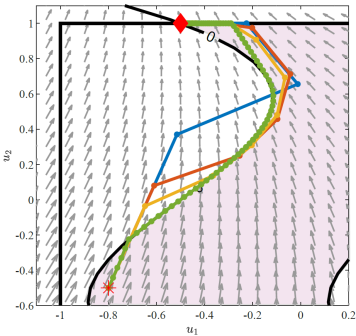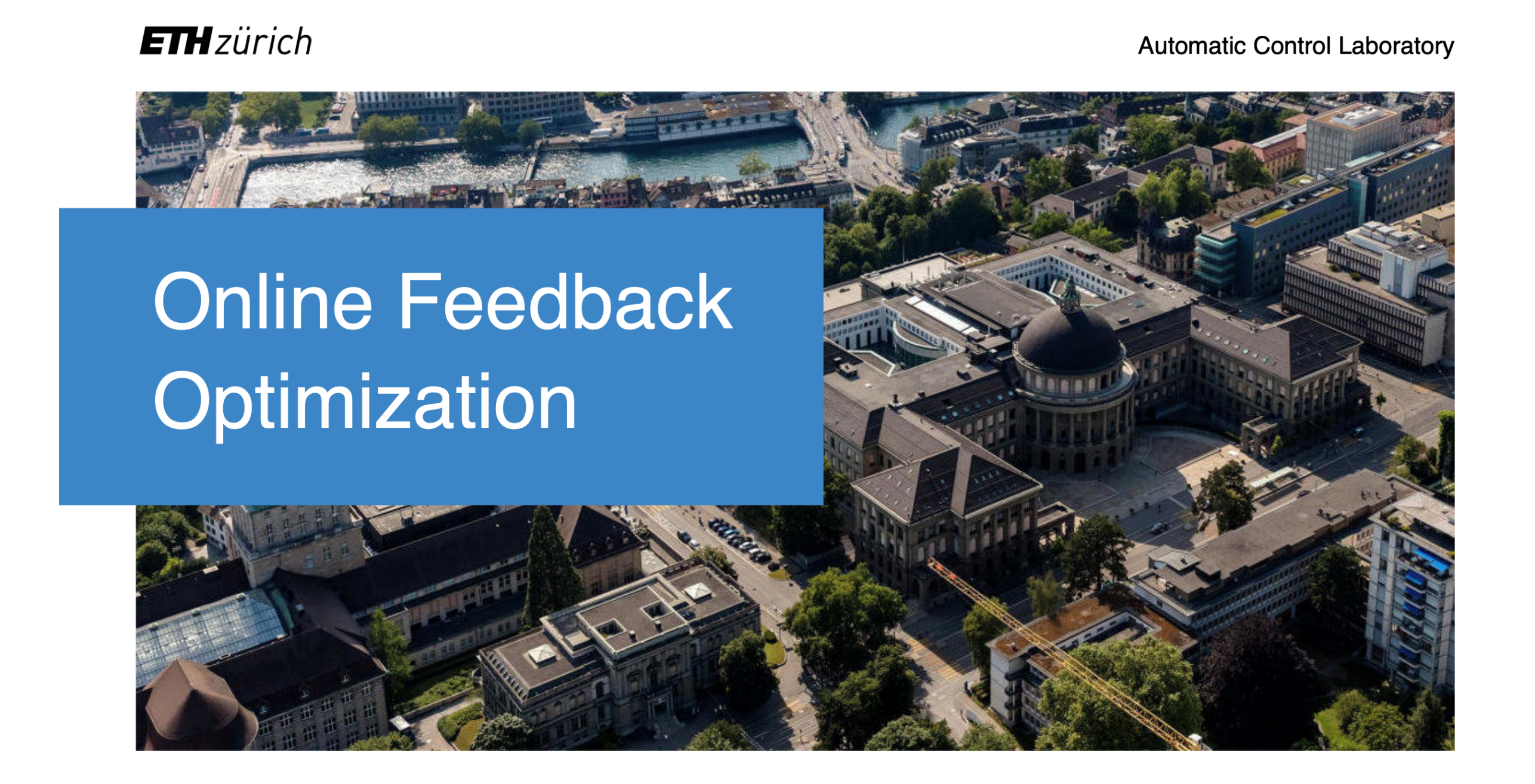Online Optimization as Feedback Controllers

Online Feedback Optimization is a novel way of controlling a system. The goal of such a controller is not to track a reference point, but to drive the system to an optimal point defined by an optimization problem (e.g. maximize a performance criterion). These controllers use iterative optimization algorithms and put them to use in a closed-loop control system. They can steer complex large-scale systems to an optimal point
Research
Driving a system to optimality
The problem that we are trying to solve is: How do we drive a complex system to optimality? More concretely, how can we determine the optimal inputs of a complex system that steer the output to the steady-state value that minimizes a given cost?
Model-based feedforward vs online feedback
Currently, this is mostly done with model-based feedforward control. Unfortunately, it is not always possible to construct a reliable model for complex systems. Even if it is possible, they are often too imprecise to be useful for this task: if the optimal input were to be computed based on an imprecise model, it would not achieve the desired performance and it could even yield an unsafe system operation.
In contrast, in online feedback optimization, we collect measurements from the system, process them to obtain an incremental update of the input towards optimality, apply the updated input to the system, and ultimately “learn” the optimal configuration from the measurements. How is this done? We use optimization algorithms like gradient descent and implement them in closed loop with the system.
Safety guarantees and certificates of optimality
The main challenge with feedback operation of a system is to predict and control the behavior of the closed-loop system. In this case, we want the system to converge to the optimal configuration while following a trajectory that is safe and feasible for the system.
These challenges, which are not present in standard numerical optimization, can be tackled with advanced control theory tools:
- Analysis of asymptotic stability of the nonlinear closed-loop system
- Analysis of the interconnection of optimization dynamics, plant dynamics, and estimation dynamics
- Design of discontinuous controllers to enforce constraint satisfaction
A new approach to power system operation
The most promising application of this theory lies in the domain of power system operation. Power grids are complex systems subject to much uncertainty (especially in the presence of renewable energy sources) and the available models cannot be used to pre-compute the optimal operating point of these systems. Fortunately, the abundance of monitoring and measurements enables the application of online optimization tools like the one that we are developing.
This approach has the potential to revolutionize the way power systems are operated in real time, tapping into the tools of feedback control rather than numerical optimization in order to yield a safe, efficient, and responsive behavior of these extremely complex systems.
We demonstrated the application of these methods to power systems in a proof-of-concept prototype at the Technical University of Denmark (DTU), and we are currently working with the French transmission grid operator RTE to explore its feasibility for large scale transmission system operation.
Publications
• Hauswirth, A., Zanardi, A., Bolognani, S., Dorfler, F. & Hug, G.
Online Optimization in Closed Loop on the Power Flow Manifold.
In Proc. 12th IEEE PES PowerTech, 2017 (Best Student Paper Award). [doi: external page 10.1109/PTC.2017.7980998]
• Ortmann, L., Hauswirth, A., Caduff, I., Dörfler, F. & Bolognani, S.
external page Experimental Validation of Feedback Optimization in Power Distribution Grids.
Electric Power Systems Research, 189:106782, 2020. [doi: external page 10.1016/j.epsr.2020.106782]
• Hauswirth, A., Bolognani, S., Hug, G. & Dörfler, F.
external page Timescale Separation in Autonomous Optimization.
IEEE Transactions on Automatic Control, 2021. [doi: external page 10.1109/TAC.2020.2989274]
• Häberle, V., Hauswirth, A., Ortmann, L., Bolognani, S. & Dörfler, F.
external page Non-Convex Feedback Optimization with Input and Output Constraints.
IEEE Control Systems Letters, 5(1), 2021. [doi: external page 10.1109/LCSYS.2020.3002152]
• Picallo, M., Bolognani, S., and Dörfler, F.
external page Closing the loop: dynamic state estimation and feedback optimization of power grids.
Electric Power Systems Research, vol. 189:106782, Dec 2020. [doi: external page 10.1016/j.epsr.2020.106753]
People
Professor
- Florian Dörfler
Senior Scientist
- Saverio Bolognani
Postdocs
- Giuseppe Belgioioso
- Dominic Liao-Mc Pherson
PhD-candidates
- Miguel Picallo Cruz
- Lukas Ortmann
Alumnus
- Adrian Hauswirth
Presentations
Research supported by
Swiss Federal Office of Energy:
UNICORN - a UNIfied COntrol framework for Real-time power system operatioN
external page https://www.aramis.admin.ch/Grunddaten/?ProjectID=41112Renewable Management and Real-Time Control Platform (ReMaP) (SI/501810-01)
SNF Assistant Professor Energy Grant #PYAPP2_160573: Plug-and-Play Control & Optimization in Microgrids
